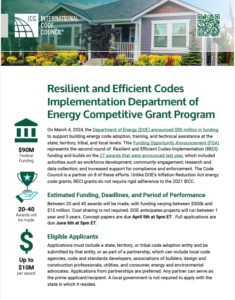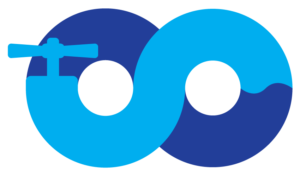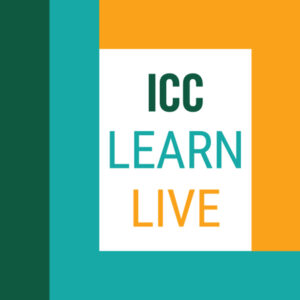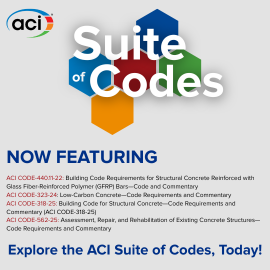2024 RECI Awards Allocate $90 Million for Sustainable Energy Transformation
On March 4, 2024, DOE announced $90 million in funding to support building energy code adoption, training and technical assistance at the state, territorial, tribal and local levels. This Funding Opportunity Announcement (FOA) represents the second round of RECI funding and builds on the 27 awards that were announced last year, which included activities such as workforce development; community engagement; research and data collection; and increased support for compliance and enforcement.
The Code Council is a partner in 8 of these efforts.
Click here for RECI fact sheet pdf.
More To Know
Eligible Applicants – Applications must include a state, territory or tribal code adoption entity and be submitted either by that entity alone or as part of a partnership. This partnership may involve various stakeholders such as local code agencies; code and standards developers; associations of builders, design and construction professionals; utilities; and consumer energy and environmental advocates. Applications from partnerships are preferred. Any partner can serve as the prime applicant/recipient. A local government is not required to apply with the state in which it resides.
Deadlines – To submit a full application, you must first submit a concept paper. Concept papers are due April 5, 2024, at 5 PM ET.
Full applications are due June 6, 2024, at 5 PM ET.
Eligible Activities – DOE's FOA focuses on enhancing building energy codes and solutions for their implementation to improve energy efficiency, resilience and equity across various sectors. Key areas of focus include technical assistance for state, territory, tribal and local code updates with additional emphasis on high-impact areas; implementation and compliance assistance with an emphasis on rural communities; workforce development and training; utilizing utility data to validate energy savings; and assisting disadvantaged communities.
Reach out to the Code Council if you are interested in including ICC as a project partner or service provider as a part of your RECI project.
Collaborate with partners at the state and local level, REEO's regional partners, non-profits and others.
Need Help?
Don’t hesitate to contact us at federalgrants@iccsafe.org for additional information on RECI and developing your grant application. The Code Council can provide guidance for project topics as well as past examples of successful applications. Click the button below to schedule a consultation with the Code Council’s grants guru, Stella Carr.
Highlights of Past RECI Grant Cycles
The Code Council was involved in eight successful RECI applications in the 2023 cycle, seeing a diverse representation of states and communities across the U.S. benefiting from this funding. To learn more about the Code Council's resilient and efficient codes solutions, access our factsheet.
Read a RECI Success Story here.









